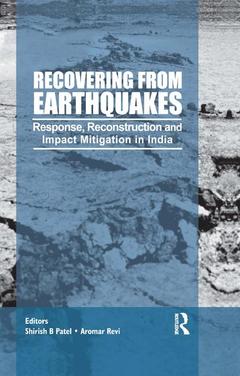Description
Recovering from Earthquakes
Response, Reconstruction and Impact Mitigation in India
Coordinators: Patel Shirish, Revi Aromar
Language: English
Subject for Recovering from Earthquakes:
Keywords
management; gujarat; national; authority; kachchh; district; richter; scale; resistant; Plaster Of Paris; construction; Dhobi Ghat; Tamil Nadu; CRED International Disaster Database; Uttarkashi Earthquake; Chamoli Earthquake; Lo Ca; DRM; Disaster Management; National Disaster Management Act; Ca Mass; Grass Roots Women’s Groups; Disaster Mental Health Care; Disaster Management Plan; Kachchh District; DRM Programme; Non-Engineered Structures; Table Top; Mass Casualty Management; In-situ Reconstruction; Urban Local Body; PML; Earthquake Resistant Technology; Swayam Shikshan Prayog; Armed Forces Hospitals
Publication date: 06-2019
· 13.8x21.6 cm · Paperback
Publication date: 02-2010
· 13.8x21.6 cm · Hardback
Description
/li>Contents
/li>Readership
/li>Biography
/li>
Earthquakes come without warming, and often cause massive devastation, resulting not only in the loss of property but also of lives. Many of the survivors suffer from intense and lasting psychological trauma. This book covers the experience of recent earthquakes in India, and what has been learnt (and what we have failed to learn) in the process of managing the aftermath in each case. This includes immediate medical attention, long-term mental health care, and the reconstruction of housing and infrastructure in both rural and urban areas.
The experiences of the contributors, many of whom have actively contributed their expertise to disaster management and recovery, help us understand what problems require a swift response and which aspects should be based on detailed analyses keeping in mind local conditions. Reconstruction is seen as offering an opportunity to rebuild society such that all sections of the population are empowered and brought into the community?s decision-making process. It is also an opportunity to develop construction techniques that are suited to local materials and skills but are also more earthquake-resistant than the old. And finally, there is the realisation that the best first responders are local community groups which need to be nurtured, and trained in crisis management and risk mitigation.
Introduction: Earthquakes in India: Response, Recovery and Impact Mitigation Shirish Patel; 2. Disasters in India: Policy Overview of Vulnerability, Risks and Human Impacts Debarati Guha-Sapir and Philippe Hoyois; 3. Uttarkashi Earthquake: Management of Relief & Rehabilitation Rajeev Kapoor; 4. Earthquake Reconstruction in Maharashtra, India: Impact on Assets, Income, and Equity Krishna S. Vatsa; 5. A Decade of Lessons from Marathwada: Earthquake Vulnerability, Politics and Participatory Housing Alex Salazar and Rohit Jigyasu; 6. Women Take the Lead: Turning a Crisis into an Opportunity for Development Prema Gopalan; 7. Compounding Disasters: First the Natural, then the Man-made: Failed Interventions We Can Learn From Sandeep Virmani; 8. Planning the Reconstruction of Bhuj B.R. Balachandran; 9. Participative Rehabilitation: A Dilemma M.N. Joglekar; 10. Lessons from the Gujarat Experience: For Disaster Mitigation and Management V. Thiruppugazh and Sudhir Kumar; 11. Disaster Management in India: Policy Intervention and Recent Initiatives Anil K Sinha, Dr Satendra and Shikha Srivastava; 12. Seismic Retrofitting of Existing Non-engineered Load-bearing Structures Rajendra Desai; 13. Medical Management of Earthquake Disasters Brig K.J. Singh; 14. Trauma after Earthquakes: Mitigating the Psychosocial and Mental Effects R. Srinivasa Murthy; 15. Catastrophe Risk Assessment and Management: Developing Risk Models for the Insurance Industry Haresh C. Shah and Weimin Dong; Afterword Aromar Revi
Shirish B. Patel is Chairman Emeritus, Shirish Patel & Associates Consultants Private Limited.
Aromar Revi is Director, Indian Institute for Human Settlements, New Delhi.
These books may interest you

Bottom-up Responses to Crisis 34.80 €



